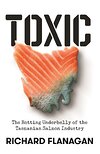

Fai clic su di un'immagine per andare a Google Ricerca Libri.
|
Sto caricando le informazioni... Toxicdi Richard Flanagan
 Nessuno Sto caricando le informazioni...
Iscriviti per consentire a LibraryThing di scoprire se ti piacerà questo libro. Attualmente non vi sono conversazioni su questo libro.   ) )The writing in the first and last chapter of the book is as good as you'll find anywhere and I hope I return to the book, if only to read these two bookends. This is a very important book for Tasmania - hopefully a line has been drawn. Only criticism is sometimes I wondered whether there was a bit of hyperbole to the writing. If the facts and assertions presented in Flanagan's book are even only half-correct, he has lifted the lid on one of the sickest tragedies ever perpetrated on the so-called clean, green island of Tasmania. This is right up there with the Gunn's disgrace, the pulp and plantation timber deceptions, and the destruction of wild places such as Lake Pedder. I've had my doubts about Tasmanian Atlantic Salmon for a while now. I don't mind admitting I've eaten the fish and enjoyed the taste in years past. But I was becoming increasingly aware of the plastic pollution issue building around south-east Tasmania, and the decline in waterways like the D'Entrecasteaux Channel and the Huon. I was alarmed at the brute-force approvals of new 'farms' in Storm Bay. Flannagan's book couldn't come soon enough. Never again. I'll never again eat this lie of a product. I won't eat it because of what it's doing to our freshwater supply, how it's wrecking our inshore waterways, and how it's damaging our native wildlife. I won't eat it because of how it abuses and deforms this noble fish - the Atlantic Salmon. I won't eat it because of the sheer volume of antibiotics, animal waste products, petrochemicals and chemicals this meat needs to be what it is. I won't eat it because of the foreign communities and environments that are harmed to produce the fish-feed. I won't eat it because of the lowering levels of Omega-3 and increasing levels of harmful Omega-6. I won't eat it because it does far more damage to our communities than it returns in economic and social benefit to Tasmania as a whole. And I won't eat it because of the sheer volume of Tasmanian lies, bullying, threats, and payoffs it takes to produce. The regulatory-capture which seems to grip our government departments and agencies charged with protecting our environment, and regulating this industry, is alarming and appalling. As a former senior-manager with the Tasmanian Integrity Commission, I am well acquainted with how 'Tasmania Inc.' works, and how the wheels of government and the protected industries turn. We need to do better, and be better. Much, much better. Everyone needs to make up their own mind, and yes, there's always two sides to a story. But I'm yet to see anything but more and more spin from the salmon companies in response. One particular company is strangely silent. The Tasmanian Salmon Growers' Association has come out and refuted some aspects of the book - and these points should also be read - but there are many aspects still not addressed in their response. A few of their points are laughable. For instance, quoting the number of laws in place means nothing when those laws are not properly enforced. 'Cherry-picking' can go two ways. And if they are as supremely confident as they seem, then why not sue the author and publisher? PR only goes so far. It could be argued Flanagan has gotten carried away in some aspects - fuelled perhaps by emotions of disgust, anger, and bitter disappointment. He pulls no punches about the personal damage done to him, and in the descriptive language he uses. Yet, the book is more than an emotional rant. The points made within it are backed by established facts and external opinion (270 footnotes from external sources) and the experiences of those brave enough to share their stories. I urge you to read this book, read what the producers are saying in response, and make up your own mind. For me, I will never again eat this 'product' the way it is currently 'farmed'. Never again. nessuna recensione | aggiungi una recensione
Premi e riconoscimenti
Is Tasmanian salmon one big lie? In a triumph of marketing, the Tasmanian salmon industry has for decades succeeded in presenting itself as world's best practice and its product as healthy and clean, grown in environmentally pristine conditions. What could be more appealing than the idea of Atlantic salmon sustainably harvested in some of the world's purest waters? But what are we eating when we eat Tasmanian salmon? Richard Flanagan's expose of the salmon farming industry in Tasmania is chilling. In the way that Rachel Carson took on the pesticide industry in her ground-breaking book Silent Spring, Flanagan tears open an industry that is as secretive as its practices are destructive and its product disturbing. From the burning forests of the Amazon to the petrochemicals you aren't told about to the endangered species being pushed to extinction you don't know about; from synthetically pink-dyed flesh to seal bombs . . . If you care about what you eat, if you care about the environment, this is a book you need to read. Toxic is set to become a landmark book of the twenty-first century. Non sono state trovate descrizioni di biblioteche |
Discussioni correntiNessuno
 Google Books — Sto caricando le informazioni... Google Books — Sto caricando le informazioni...GeneriSistema Decimale Melvil (DDC)639.375609946Technology Agriculture & related technologies Hunting, fishing, conservation Culture of cold blooded vertebrates Culture of amphibians and specific kinds of fishesVotoMedia: (4.35) (4.35)
Sei tu?Diventa un autore di LibraryThing. |
||||||||||||||||||||||||||||||||||||||||||||||||||||||||||||||||||||||||||||||||||||||||||||||||||||||||||||||||||||||||